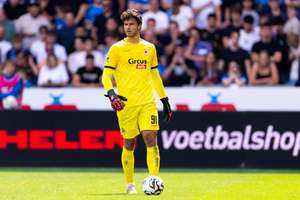Liverpool stole the show with their purchase of Alexander Isak for £125 million, making him the priciest signing in British history. The Swedish striker notched 23 league goals last season, with a return that comfortably put him in Erling Haaland's league.
Flashscore's xG data backed up the move, showing that Isak scored almost exactly in line with his expected goals tally. Adding Florian Wirtz for £100 million, the Bundesliga's most creative midfielder, has made Liverpool's attack look like it was assembled by a Football Manager enthusiast.
Manchester City quietly moved on from Ederson after eight trophy-laden years, replacing him with Gianluigi Donnarumma for a reported €30m (£25.5m). It feels cold, but Pep Guardiola does not buy nostalgia.
Tottenham were refreshingly strategic, adding Mohammed Kudus and Xavi Simons to inject dribbling and chance creation. They also brought in Randal Kolo Muani on loan on deadline day, giving them options that scream "late-game chaos merchants".
Arsenal bought like grown-ups, plugging gaps with Martin Zubimendi, Eberechi Eze, and Viktor Gyokeres. No melodrama, just competence, which in this league is practically exotic.
Chelsea's revolving door kept spinning, naturally. João Pedro looks a smart fit, but Nicolas Jackson's loan to Bayern with a potential £40m obligation summed up Stamford Bridge's eternal chaos.
Manchester United did sensible business, upgrading with Benjamin Sesko, Bryan Mbeumo, and Matheus Cunha. Rashford's loan to Barcelona and Hojlund's to Napoli were ruthless but necessary, leaving United with a frontline that looks suspiciously like it was assembled by someone who actually reads scouting reports.
Beyond the Premier League bubble, this window still had a decent plot. Kevin De Bruyne to Napoli on a free is a romance with structure, pairing Antonio Conte's choreography with perhaps the game's best director.
Real Madrid quietly hoovered up the future by adding Dean Huijsen, Alvaro Carreras, and Franco Mastantuono to an already frighteningly young and vibrant squad. Bayern filled their left-wing void with Luis Diaz, which is a very Bayern sort of solution.
The continental power map did not redraw itself, but several clubs coloured inside the lines with a smidgen of restraint, largely because UEFA's new squad cost rules and domestic financial controls have tightened the leash.
Premier League accountants are reaching for the paracetamol. Clubs torched a record £3 billion on transfers, leaving a collective net spend of around £1.2 billion. Liverpool went full pyromaniac with a -£221m outlay, while Arsenal were only a hair behind at -£225m.
Chelsea, hilariously, ended up with a £17.7m profit despite doing their usual supermarket sweep impression. Todd Boehly turned chaos into cash, unveiling a brand-new model in modern football ownership with Chelsea: a football club that's also a hedge fund in football shirts.
The numbers prove what we already suspected: the Premier League is the financial equivalent of a casino at 3am, where the roulette wheel spins endlessly and everyone insists their bet was part of a grand plan.
The worst deals? Newcastle losing Isak despite pretending otherwise for most of August. Chelsea giving Bayern a striker to fix their own lack of one. City waving goodbye to Ederson without a testimonial in sight. And every negotiation that dragged on until deadline day, landing exactly where it could have in July.
So who won the window? Liverpool, unequivocally. Arsenal upgraded without fuss. Spurs became more watchable. City refreshed efficiently. United looked like adults. Chelsea... were Chelsea. And in Europe, Napoli found stardust, Madrid stocked the future, and Bayern did Bayern things.
The window is shut, wallets are empty, and only one certainty remains: by January, half these decisions will look either visionary or deranged.













